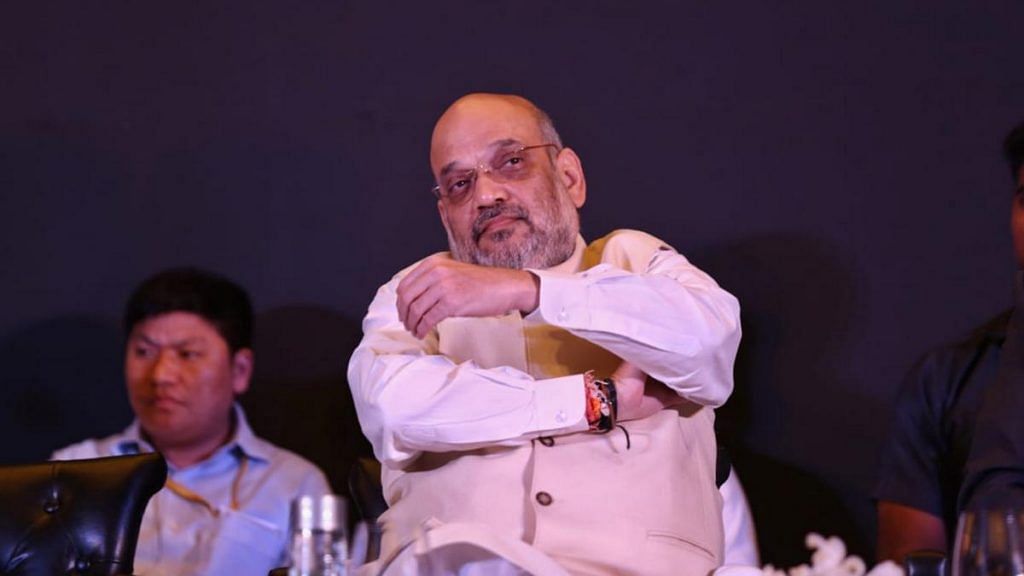Bengaluru: Union Home Minister Amit Shah may have made conciliatory noises after the outrage that followed his “one nation, one language” statement, but the Bharatiya Janata Party will not find it easy to erase the perception that it places Hindi above other Indian languages.
Even if Hindi is not made the sole national language of the country in a hurry, the push for it continues in other ways. The examinations for recruitment in public sector banks and other central government undertakings are a case in point.
Over 12,000 clerical vacancies in nationalised banks have recently been announced by the Institute of Banking Personnel Selection (IBPS), for which the preliminary and mains examinations can be written in English and Hindi but not in any of the other Indian languages. This is a rule patently unfair to non-Hindi job seekers who are forced to write the examination in English, a language many may not be as comfortable with as they are with their mother tongues.
About 3,000 of these vacancies are in the five southern states.
Recruitments for vacant positions in regional rural banks (RRBs) were also announced this month, but despite the assurance given by Finance Minister Nirmala Sitharaman in Parliament in July, there was no mention of the regional language option in the notification.
It was only after a public outcry in the southern states and protests by Opposition parties that the IBPS issued a revised notification, allowing candidates to write the examination in 13 regional languages apart from Hindi and English.
But the domicile clause stipulating that candidates appearing for the examinations should have studied the language applicable to the state is yet to be restored.
Also read: Kamal Haasan says no ‘Shah, Samrat’ must renege on promise to not impose Hindi
Consequences of the decision
The regional language option was done away with after the Narendra Modi government assumed office in 2014.
As a consequence of the removal of the domicile clause and the lack of language options beyond Hindi and English, an overwhelming majority of rural bank jobs have gone to people hailing from other parts of the country than the state in which the recruitments were made. In Karnataka, for instance, reports say a measly 1,060 RRB jobs out of 18,000 vacancies went to local residents.
After banks, it is now the recruitment announcement by the Life Insurance Corporation of India that has sparked outrage. Again, the examination can be written only in Hindi or English. The LIC is filling up 7,800 posts of assistants (clerks).
Former Karnataka Chief Minister and Congress leader Siddaramaiah tweeted: “After IBPS, it is now LIC. For how long should Kannadigas tolerate the imposition of other languages?”
Earlier this year, recruitment examinations conducted by the Department of Posts had sparked off protests in Tamil Nadu, following which the circular was amended to include the option of Tamil as a medium, apart from English and Hindi. The DMK had also protested against the practice of the Indian Railways conducting competitive examinations only in English and Hindi.
“This move has brought deep discomfort in Tamil Nadu. After the controversial circular recanted by the Postal Department, this is the second instance of the imposition of Hindi in government undertakings,” the DMK said in a letter to the Railway Board.
Embarrassment for the BJP
Shah’s pitch for Hindi and the perceived favouritism towards the language in recruitment examinations in central government undertakings has not just angered the Opposition parties in the southern states but has embarrassed the BJP too.
At a time when the BJP has laid itself bare to criticism that it does not stand for the values of federalism, Shah’s ill-advised Hindi push does not make for smart politics.
For one, it has given a stick to Opposition parties in non-Hindi states to beat the BJP with.
If the BJP continues to favour Hindi over other languages, it can forget whatever little chance it has to make headway in Tamil Nadu, a state that has always been at the forefront of the battle against Hindi “imposition”.
More importantly, it has put the BJP in the non-Hindi states so much on the defensive that Karnataka Chief Minister B.S. Yediyurappa took on Shah, even if indirectly, by declaring: “All official languages in our country are equal. However, as far as Karnataka is concerned, Kannada is the principal language. We will never compromise its importance and are committed to promote Kannada and our state’s culture.”
Yediyurappa realises the potential damage of Shah’s “one nation, one language” speech to the BJP’s electoral fortunes in Karnataka. By-elections are due to be announced for 17 assembly seats, and the BJP has to put up a good show to fortify its position in the legislature, where it has a wafer-thin majority.
The BJP’s ally in Tamil Nadu, the AIADMK, is upset too, as is its West Bengal state unit.
Also read: Modi is set to fly to US, and Amit Shah wants Indians to say ‘Howdy, Modi!’ in Hindi
Hindi, Hindu, Hindustan
Year after year — even during the Congress regime — home ministers who are also in charge of the Department of Official Language make routine speeches calling for wider use of Hindi in administration. But with the BJP, the language issue assumes a far serious dimension.
In the imagination of the BJP and its ideological parent, the Rashtriya Swayamsevak Sangh, India has always been “Hindi, Hindu, Hindustan”, a slogan coined by Hindutva icon V.D. Savarkar.
Expanding the use and reach of Hindi is very much on the agenda of the BJP, as the aborted attempt to make Hindi learning compulsory in schools across the country, a proposal in the New Education Policy, will tell us.
Also read: Talk of Hindi dominance a joke. English/non-English divide is the real apartheid in India
